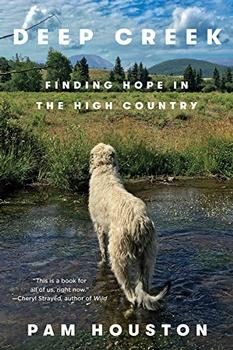Summary | Excerpt | Reviews | Beyond the Book | Read-Alikes | Genres & Themes | Author Bio

Finding Hope in the High Country
by Pam HoustonThis article relates to Deep Creek
 On June 5, 2013, lightning struck dead spruce trees 15 miles south of Pam Houston's ranch, sparking what would become known as West Fork Complex – one of the largest wildfires in Colorado history. West Fork Complex eventually consumed over 100,000 acres in Colorado and became one in a long and growing list of recent wildfires that have ravaged swaths of the Western U.S.
On June 5, 2013, lightning struck dead spruce trees 15 miles south of Pam Houston's ranch, sparking what would become known as West Fork Complex – one of the largest wildfires in Colorado history. West Fork Complex eventually consumed over 100,000 acres in Colorado and became one in a long and growing list of recent wildfires that have ravaged swaths of the Western U.S.
Wildfires in this area are on the increase, whether measured as a count of large fires, the number of acres burned, or a count of states setting records for single wildfire size. A few data points summarize this trend:
Several sources point to multiple and converging causes that directly contribute to the escalation of wildfires, but one of these is acknowledged as the primary, driving factor: the increased temperatures brought on by climate change.
Some of the direct factors cited include:
These factors, though listed and described here individually, are interconnected and reinforced by each other. Rising temperatures lead to an earlier snowmelt. Drier conditions lead to the spread of tree-killing insect infestations and the increase of wildfire fuels.
The escalation in wildfires isn't limited to the Western U.S.; research shows that this is a global trend. The factors listed above stem from the complex interplay of forces under the larger umbrella of climate change. According to "Western U.S. Wildfires and the Climate Change Connection," a fact sheet published by World Resources Institute: "No single wildfire can be attributed to climate change. However, research shows that climate change is increasing the duration and severity of wildfires in certain regions, and is expected to continue doing so in a warmer world."
West Fork Complex wildfire courtesy of The Denver Post
Filed under Nature and the Environment
![]() This "beyond the book article" relates to Deep Creek. It originally ran in February 2019 and has been updated for the
January 2020 paperback edition.
Go to magazine.
This "beyond the book article" relates to Deep Creek. It originally ran in February 2019 and has been updated for the
January 2020 paperback edition.
Go to magazine.
Your guide toexceptional books
BookBrowse seeks out and recommends the best in contemporary fiction and nonfiction—books that not only engage and entertain but also deepen our understanding of ourselves and the world around us.